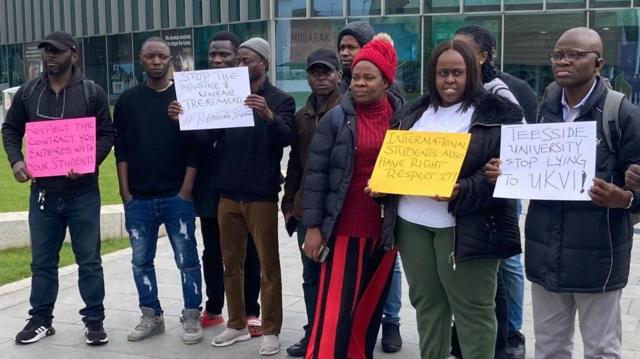Nigerian students studying at Teesside University are currently devastated after some of them were thrown out of their course and ordered to leave the country due to their inability to pay their school fees on time.
This latest development is a result of the drastic devaluation of Nigeria’s currency and high inflation that has forced the students to discontinue their studies.
Teesside University removed students facing financial difficulties from their courses and reported the situation to the Home Office, following the depletion of some students’ savings due to the devaluation of Nigeria’s currency, the naira.
READ MORE: LemFi Suspends Ghana Operations, Here’s Why
The students, some of whom say they have been contacted by debt collection agencies, protested outside the campus on Tuesday, accusing the university of being “heartless”.
The university said it had “no choice” as failure to pay was a breach of visa sponsorship rules. It said it had made every effort to help the affected students, including with bespoke payment plans.
Before beginning their studies at Teesside, affected students were told they had to show proof of having enough funds to pay tuition fees and living expenses.
However, those funds were significantly depleted as a result of the crisis in their home country.
The university’s decision to alter the payment plans for tuition fees from seven installments to three has further intensified the financial difficulties faced by students.
The Student’s Reaction
According to the BBC, a group of 60 students asked the university for help after they defaulted on their fees when their savings were wiped out.
Adenike Ibrahim told the BBC she was close to handing in her dissertation when she was kicked off her course because she was unable to make a payment.
Despite having now paid her fees in full, she will have to leave the UK with her young son and cannot re-enroll.
“I did default [on payments], but I’d already paid 90% of my tuition fees and I went to all of my classes,” she told the broadcaster. “I called them and asked to reach an agreement, but they do not care what happens to their students.”
Since receiving his letter, one master’s degree student – who did not want to be named – said he had seriously considered suicide and was not eating or drinking.
Esther Obigwe said she repeatedly tried to speak to the university about her financial struggles but received no response until she too was blocked from her studies and received notice to leave the country.
“I attended all of my classes and seminars, I’m a hell of an active student,” she said.
“It is disheartening, I am now on antidepressants, and being here alone, I have nobody to talk to.
“For over two months, I’ve barely eaten or slept and I don’t understand why this is being meted at us, we didn’t do anything wrong.”
She added that most of the students had “spent a lot of money to be here”.
Jude Salubi, who was studying to be a social worker, was midway through a placement when he was told his access to the university was suspended and he would have to leave the country.
Before that, he traveled from Teesside to Liverpool each weekend to work 18 hours in an attempt to pay off the outstanding fees.
“As of now I have paid £14,000 and have a balance of £14,000,” he said.
“I am willing to agree as to how I will make this payment, but I need guarantees that I will be re-enrolled into school and my visa restored.”
Some told the BBC they felt suicidal as they accused the university of taking a “heartless” approach to those who fell into arrears as a consequence.
However, some affected students have managed to pay off outstanding fees, but the university is now unable to intervene in the Home Office process,
Teesside’s University Reveals Why The Nigerian Students Had To Go
Teesside, unlike most UK universities which require foreign students to pay their full fees upfront, allows students to pay in installments as long as they can show they have enough funds for fees and living expenses.
A university spokesperson said: “Teesside University is proud to be a global institution with a diverse student population but is also very aware of its obligations regarding visa issuance and compliance. These strict external regulations ensure that the university fully supports a robust immigration system and is outside of the university’s control.”
The spokesman added it was “aware of the challenging financial situation faced by some students” and had “actively offered bespoke payment plans where requested”.
“This option has been taken up by many of our international students; however, some students have still defaulted on these revised payment plans,” he said.
The Home Office said a decision to offer or withdraw visa sponsorship rested with the sponsoring institution.
The spokesperson said wherever a visa was shortened or canceled, individuals should “take steps to regularise their stay or make arrangements to leave the UK”.
The spokesman added it was “aware of the challenging financial situation faced by some students” and had “actively offered bespoke payment plans where requested”.
“This option has been taken up by many of our international students; however, some students have still defaulted on these revised payment plans,” he said.
The Home Office said a decision to offer or withdraw visa sponsorship rested with the sponsoring institution.
A spokesman said wherever a visa was shortened or canceled, individuals should “take steps to regularise their stay or make arrangements to leave the UK”.
What To Know
Nigeria is facing a severe economic crisis after the value of its currency dropped sharply amid reforms introduced by the president, Bola Tinubu, who came into office a year ago, aimed at balancing its economy. It is experiencing nearly 30% inflation, with the price of some key goods, such as rice, more than doubling in less than a year.










